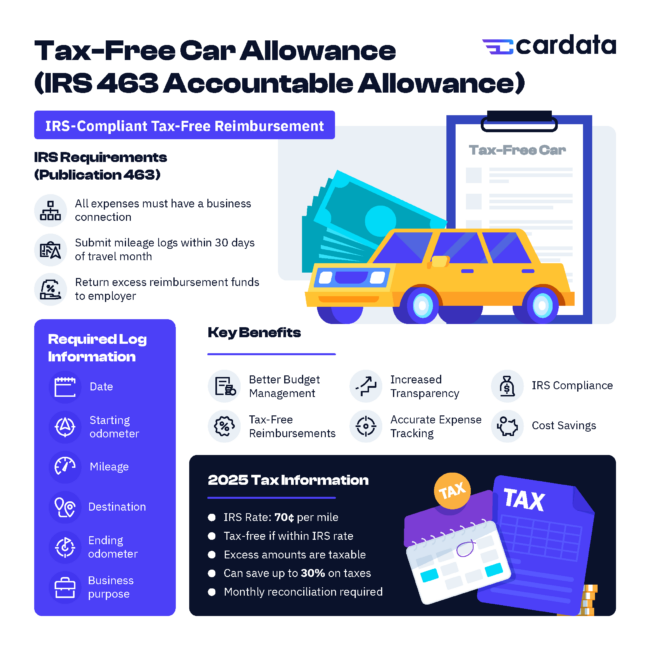Follow us on LinkedIn
Our PageAAG: Accountable car allowance plans keep reimbursements IRS-compliant and tax-free, saving your enterprise money. All you need to do is monitor your expenses in a mileage log to justify business-related costs.
As a company with employees who drive for work, you know that managing their car allowances can be a tricky task. However, with an accountable car allowance plan, you can ensure that your reimbursements are fair and IRS-compliant, potentially saving you money that would otherwise go to taxes. Fair warning: it takes work, but the advantages are worth the effort.
Let’s go over what you need to know about accountable car allowances and how they can benefit your company and your mobile employees.
What is an accountable car allowance plan?
An accountable car allowance plan is a way for employers to reimburse mobile employees for work-related travel expenses. Governed by IRS publication 463, this program uses the IRS standard mileage rate (65.5 cents per mile, as of 2023) as a guideline for calculating monthly reimbursement funds and possible tax burdens.
The main objective of an accountable car allowance plan is to ensure that all reimbursements are properly justified. For that reason, the IRS requires that drivers maintain a detailed log of all business expenses, including trip dates and times, starting and ending locations, purposes of travel, and total distance driven. (Feel free to check out our article on IRS-compliant mileage tracking for a free downloadable custom log you can use to manage your expenses.)
In general, the IRS outlines three mandatory rules drivers and employers must follow when handling this type of car allowance plan:
- All expenses must have a business connection.
- Employees have to provide mileage logs to their employer within a reasonable time frame (typically within 30 days at the conclusion of a travel month).
- Excess reimbursement funds have to be returned to the employer at the end of the monthly allowance period.
If you fail to obey these regulations or your expenses exceed the IRS standard mileage tax rate, your reimbursements will be subject to tax deductions. Let’s get into how these taxes can impact your budget.

What are the tax implications of an accountable car allowance plan?
If the IRS can’t validate that your car allowances were used for business purposes, they’ll view these expenses as taxable income. Likewise, consistently overfunding employees for travel expenses will generate some questions from the IRS.
As we mentioned earlier, the IRS uses 65.5 cents per mile as a benchmark measurement for evaluating expenditures with accountable car allowance plans. At the end of each month, employers have to compare their actual car allowance value to that recommended by the IRS.
For example, say you give your employees $500 a month for their car allowance, but they only drive 400 miles. This puts your reimbursement value at $1.25 per mile—almost twice as expensive as the IRS rate of 65.5 cents per mile. The IRS will consider the difference as tax deductible, deducting $238 from your original car allowance of $500 to match the federally recommended allowance rate of $262 for 400 miles of travel (0.655 x 400 = 262).
Remember, you also need to keep track of where your dollars are being spend while your employees are on the road. According to IRS publication 463, drivers must log, at minimum:
- The cost of each separate expense
- The cost of the car and any improvements
- The date they started using the car for business
- The mileage for each business use
- The total miles for the year
- The date of the expense
- The date of the use of the car
- All business destinations
- The business purpose for each expense
While this is a lot of information to manage on a daily basis, there are automated mileage tracking systems and apps you can use (like Cardata Mobile) to easily update mileage logs, and often with more accuracy than paper logs. After all, doing so can save your company up to 30% of your total reimbursement sum by helping you retain money that would otherwise be taxed.
What are the benefits of using an accountable car allowance plan?
An accountable car allowance plan offers several benefits for both employers and employees.
- Budget Management – One of the most significant advantages is that tracking work-related expenses enables employers to better manage budgets allocated to car allowances. Companies can adjust reimbursements to accurately reflect spending, allowing them to save money that can be invested in other areas of their business.
- Tax-Free Reimbursements – Using an accountable car allowance plan can also help to avoid taxes being taken from employee paychecks. This is because, if managed responsibly, reimbursements are not subject to payroll or income tax.
Transparency – regular record-keeping supports company transparency, as both employers and employees know what reimbursements are being used for and how much the cost of taxes will be, if any. This transparency helps establish accountability between employers and employees and encourages careful use of reimbursed funds.
How does an accountable plan compare to other car allowance policies?
Unlike fixed monthly payments, an accountable car allowance plan provides a more personalized approach that reflects actual spending and can make reimbursements tax-free. It can be applied to various car allowance policies, including flat-rate allowances, mileage reimbursements, and Fixed and Variable Rate (FAVR) programs, as long as trip details are recorded. Here’s a quick overview of what each car allowance type consists of:
- Flat-Rate Allowance: This is a fixed monthly payment that’s given to employees for car-related expenses, regardless of how much they actually spend. While this is an easy way to manage expenses, it doesn’t take into account your actual spending, and can lead to overbudgeting or underfunding.
- Mileage Reimbursement: With this method, you get paid a fixed amount per mile driven, based on the current IRS standard mileage rate. While this is a simple way to calculate reimbursements, it doesn’t always accurately reflect your actual expenses. If you have a car that requires a lot of maintenance, for example, you may end up spending more on expenses than you receive in reimbursement.
- FAVR Plan: This type of car allowance considers both fixed and variable costs like insurance, maintenance, and gas prices, making it the most accurate reimbursement option available. It’s essentially a combination of the flat-rate and cents-per-mile plans, adjusted to market data.
Accountable car allowance plans are a better option than taxable car allowances, where employers give a set lump sum amount to drivers each month without any mileage tracking. When reimbursements are given without insight into how they are being used, it can result in overbudgeting, taxed employee paychecks, and less driving if employees have already exhausted their allowance.
With an accountable plan, both employers and employees know exactly what each dollar is being used for and how much potential tax burdens will be. This way, everyone is on the same page, and there are no surprises at the end of the month.
Manage your reimbursements efficiently with Cardata
Tax-free car allowances, including accountable plans, take work—but you can leave it all to us. At Cardata, our reimbursement programs are tailored to meet your business needs in mind while ensuring compliance with IRS guidelines. Whether you prefer FAVR allowances or mileage reimbursements, we provide automated, intelligent solutions that update travel data and expenses in real time for maximum precision.
Ready to stop losing money to taxes for car allowances? Get started with us today by booking a demo.
Share on:



